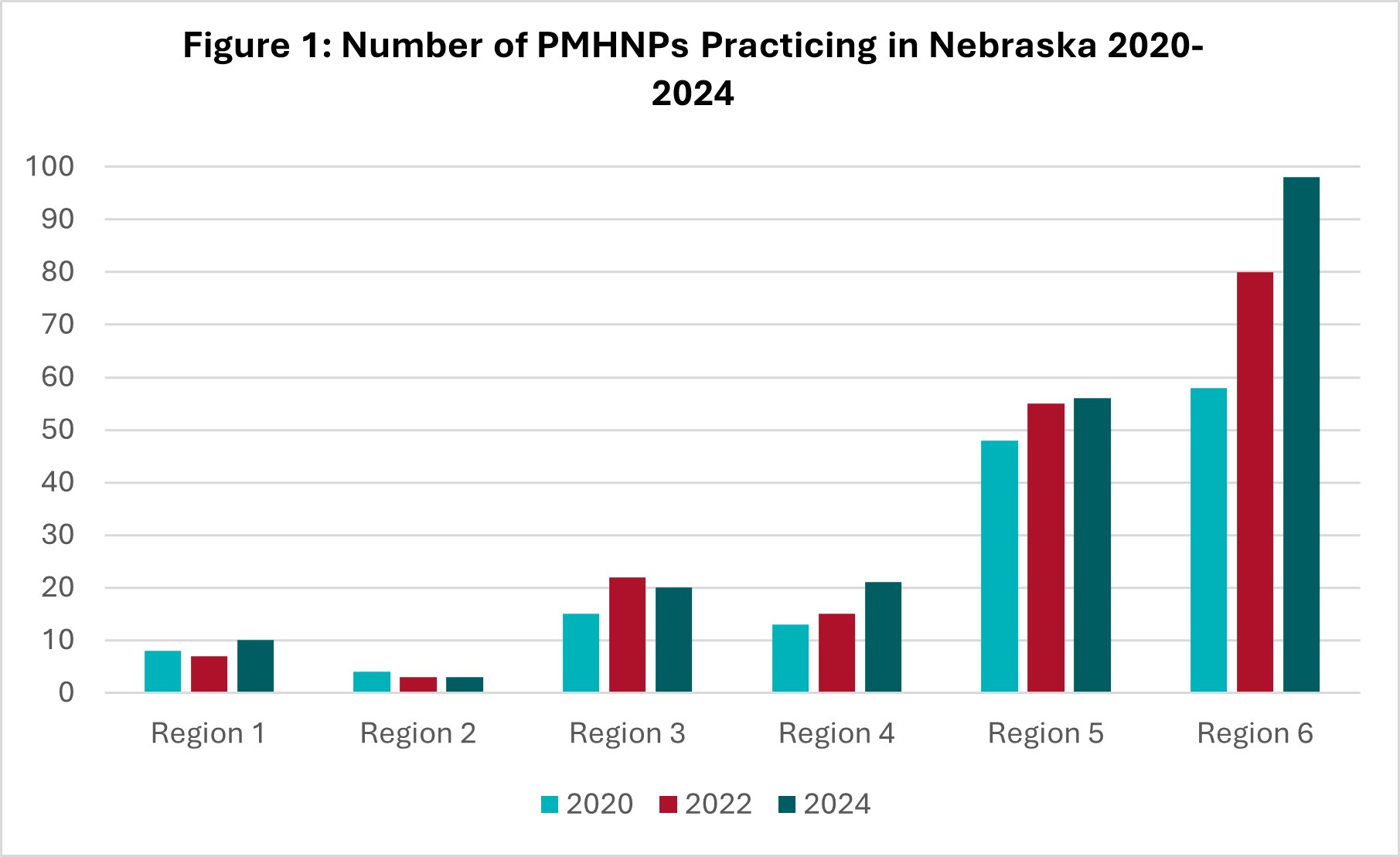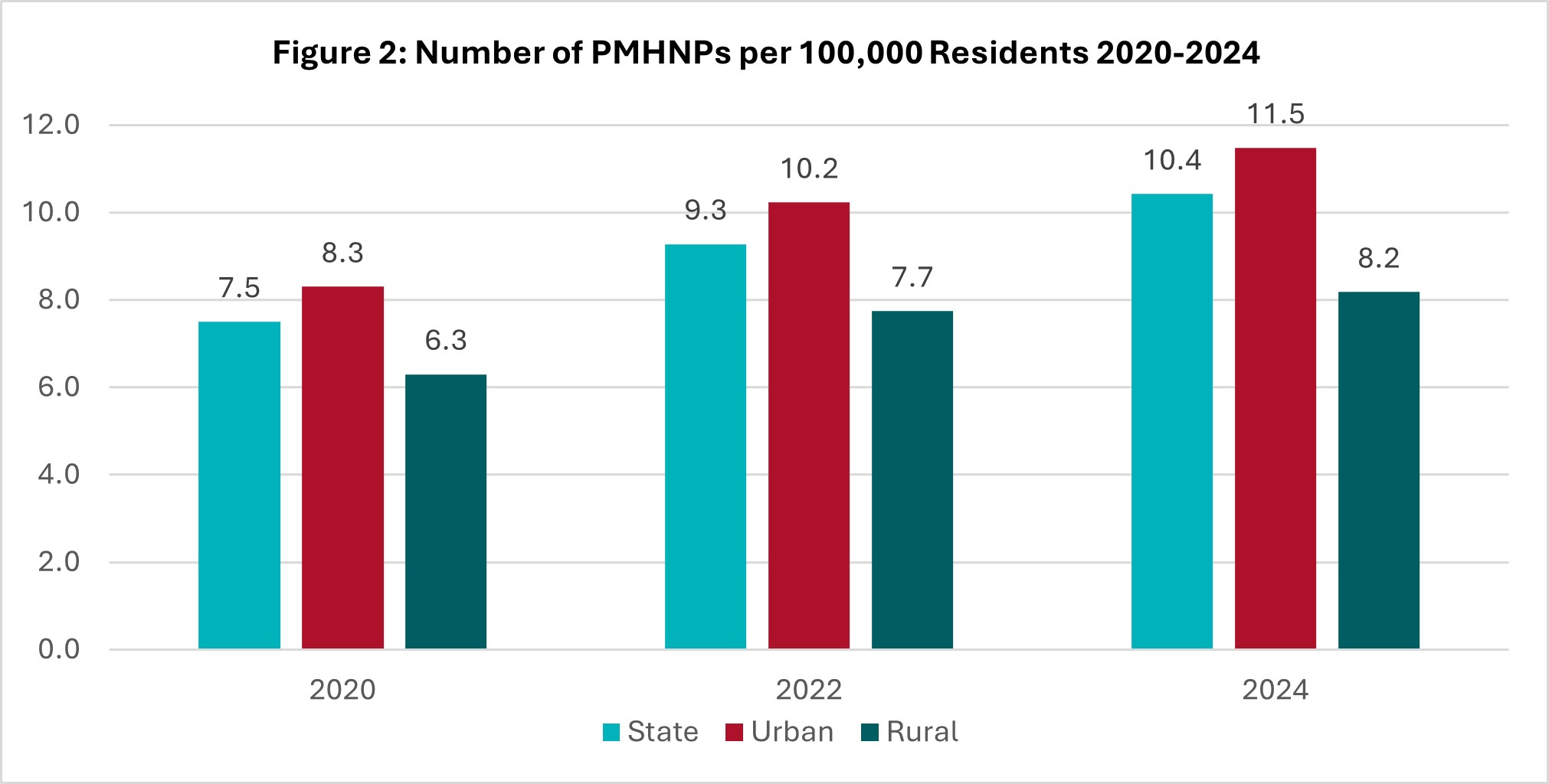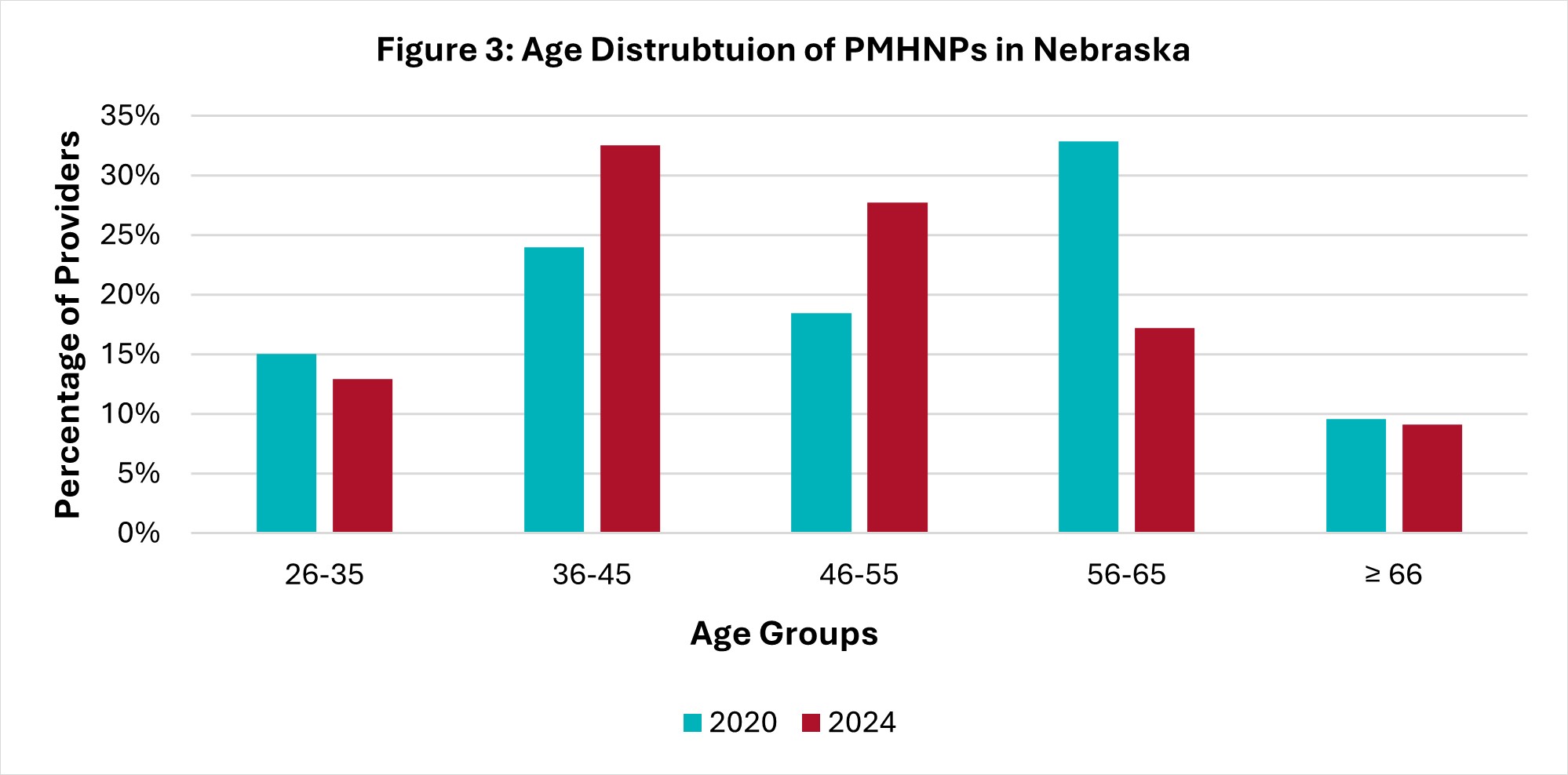The Psychiatric Nurse Practitioner Workforce in Nebraska: 2020 to 2024
Purpose
BHECN utilizes data from the UNMC Health Professions Tracking Service to determine the number and type of licensed behavioral health professionals who practice in Nebraska. This data snapshot provides information about the Psychiatric Mental Health Nurse Practitioner (PMHNP) workforce from 2020 to 2024.
PMHNPs are advanced practice registered nurses (APRN-NP) who can diagnose and treat mental illnesses and promote the mental health of individuals and families. PMHNPs offer psychiatric/mental health assessments and therapies, order laboratory tests, and manage medications. They specialize in treating those who have more serious mental health problems than those managed by a local primary care physician.
Key Findings
- The Nebraska PMHNP workforce grew 43% from 2020 to 2024.
- The number of providers increased in 5 of the 6 Nebraska Behavioral Health Regions and in rural areas.
- The number of PMHNPs per 100,000 population still lags behind the national average.
Regional Trends
The number of licensed PMHNPs practicing in Nebraska increased 43% from 2020 to 2024 (from 146 to 209). The number of PMHNPs increased in all Nebraska Behavioral Health Regions except Region 2 (see Figure 1).[1]

Rural and Urban Distribution of Psychiatric Nurse Practitioners
The number of PMHNPs in urban and rural areas increased from 2020 to 2024, but rural areas still had fewer providers per 100,000 population compared to urban areas (see Figure 2). In 2024, the average number of PMHNPs per 100,000 population across the US was 14.5.[2] Nebraska’s urban areas had 11.5 PMHNPs per 100,000 population, while rural areas had 8.2 per 100,000.

Age of Psychiatric Nurse Practitioners
Since 2020, the number of PMHNPs at or nearing retirement age has decreased, and the number of providers aged 36-45 has increased (see Figure 3).

Psychiatric Nurse Practitioner Training Programs
PMHNP education takes at least six years to complete. This includes an undergraduate degree in Nursing (BSN) and a 2-year Master’s degree or a 3-year Doctor of Nursing Practice degree, often with at least one year of nursing practice experience between undergraduate and graduate education required for acceptance into a program.
There are three PMHNP education programs in Nebraska: Clarkson College, Creighton University, and UNMC. The Clarkson and Creighton programs are in Omaha. The UNMC program offers training at all 5 of its Nursing campuses (Omaha, Lincoln, Norfolk, Kearney, and Scottsbluff). Clarkson began their PMHNP program in 2020. Creighton started its PMHNP program in 2017. UNMC started advanced practice psychiatric nurse training as a Certified Nurse Specialist program in the 1960s, which was transitioned to a Nurse Practitioner curriculum in 1996. It expanded to all campuses in the late 1990s and doubled its capacity in 2008.
PMHNP training programs require specific core competencies, along with a minimum of 500 hours of faculty-supervised, preceptor-led direct patient care clinical experience. These clinical hours are typically unpaid for both the student and the preceptor and are not standardized. To become a board certified PMHNP, APRNs must: hold an RN license; have completed a Master’s degree, post-graduate certificate program (for those who are already APRNs in another specialty), or a DNP from an accredited training program; have completed the 500 hour minimum supervised practice requirement; and pass either the American Nurses Credentialing Center or the American Academy of Nurse Practitioners Psychiatric Mental Health Nurse Practitioner board certification exam.
To become licensed in Nebraska, individuals must have practiced for 2,000 hours or have a formal, written Transition to Practice agreement with a supervising physician, osteopathic physician, or another APRN who has at least 10,000 hours of practice.[3] This Transition to Practice agreement must include 2,000 hours of supervised practice. Some APRNs, especially in rural areas, have a difficult time finding supervisors willing to enter into this practice agreement and often require payment to do so.
Conclusions
The PMHNP workforce in Nebraska has grown since 2020, particularly in rural areas, with 5 of the 6 Behavioral Health Regions experiencing an increase in numbers. Nebraska offers PMHNP training opportunities in nearly every Behavioral Health Region across the state. The availability of PMHNPs remains higher in Nebraska’s urban areas compared to rural areas. Overall, these findings highlight positive changes in the Nebraska PMHNP workforce along with the need for continued efforts to better understand and address shortages in rural areas of the state.
Suggested citation:
Behavioral Health Education Center of Nebraska. (2025). The Psychiatric Nurse Practitioner Workforce in Nebraska: 2020 to 2024. https://www.unmc.edu/bhecn/research-data-policy/2020_2024_aprn_snapshot.html
Footnotes
[1] Nebraska Department of Health and Human Services. (2025). Behavioral Health Resources for Schools: Division of Behavioral Health. https://dhhs.ne.gov/BHSchoolResources/AboutDBH.pdf
[2] American Academy of Nurse Practitioners 2024 certification statistics https://www.aanpcert.org/certs/pass ; American Nurses Credentialing Center 2024 Certification Data https://www.nursingworld.org/globalassets/docs/ancc/ancc-cert-data-website.pdf
[3] Nebraska Legislature. (2025). Nebraska Revised Statute 38-2322. https://nebraskalegislature.gov/laws/statutes.php?statute=38-2322